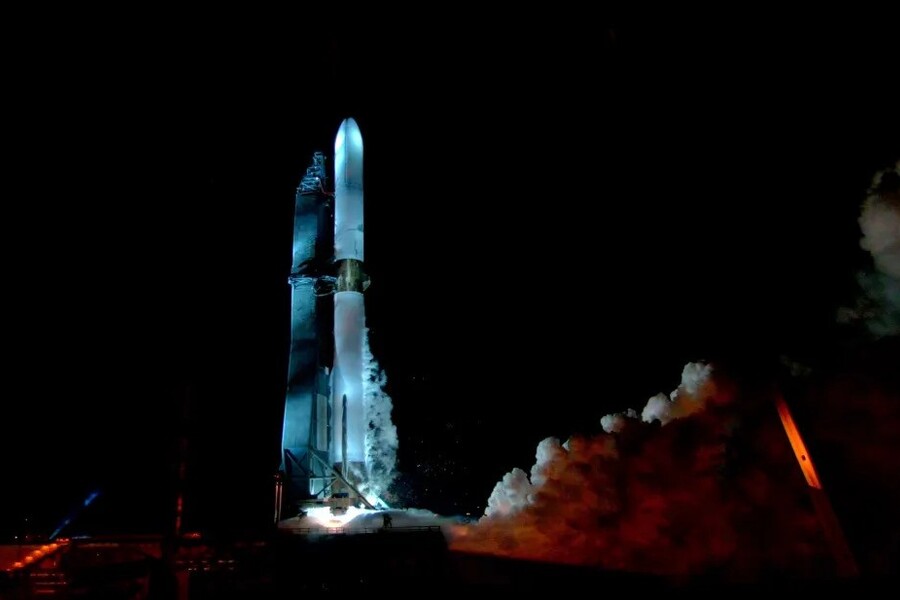Jeff Bezos’ Blue Origin is on the brink of a monumental leap forward, preparing to launch its first orbital rocket, the New Glenn, and officially step into the fiercely competitive space industry dominated by Elon Musk’s SpaceX. Founded nearly 25 years ago, Blue Origin has long promised a revolutionary approach to space exploration, and now, with the New Glenn launch days away, the company is positioning itself as a formidable player in the commercial space race.
The towering New Glenn rocket, standing an impressive 320 feet tall, has passed nearly all pre-launch hurdles. A recent air traffic advisory hints at a potential launch date of January 6, though company executives remain tight-lipped about specifics. What’s clear is that the stage is set: Blue Origin recently secured a five-year launch license from federal regulators and completed a crucial fire test, simulating launch conditions with the rocket’s BE-4 engines.
David Limp, Blue Origin’s CEO, confirmed that the last step before liftoff is attaching the rocket’s payload fairing. Once the New Glenn takes to the skies from Cape Canaveral, Florida, it will be powered by seven Blue Origin-built BE-4 engines, generating an awe-inspiring 3.8 million pounds of thrust. The rocket’s mission? To carry cutting-edge demonstrator technology for Blue Origin’s Blue Ring spacecraft, an orbital transfer vehicle designed for satellite transportation, logistics, and in-orbit servicing.
This inaugural launch is far more than a milestone for Blue Origin—it’s a statement of intent. SpaceX, with its Falcon 9 rocket, currently dominates the market for launching national security payloads, commercial satellites, and more. By entering this arena, Blue Origin is signaling its ambition to not only compete but to redefine the standards of the industry.
Blue Origin’s path to this point has been defined by incremental progress. Until now, the company’s most notable achievement has been the New Shepard suborbital rocket, which has ferried space tourists and cargo on brief journeys to suborbital space. The New Glenn, however, represents an entirely different caliber of ambition, one that aims for sustained orbital operations and reusable rocketry.
The New Glenn’s first-stage booster is designed for vertical landing on a floating barge, allowing for refurbishment and reuse up to 25 times. This reuse model mirrors SpaceX’s groundbreaking approach, which has been pivotal to its success. If New Glenn delivers as promised, it will mark a significant step forward in the efficiency and sustainability of orbital launches.
NASA has already placed its trust in Blue Origin, awarding the company a contract to launch twin spacecraft to Mars aboard the New Glenn. Although those satellites were rescheduled for a later mission due to launch delays, the agency’s endorsement underscores the rocket’s potential. Blue Origin has also secured contracts with the U.S. Space Force, Amazon’s Project Kuiper, and other commercial clients, setting the stage for a robust pipeline of launches.
The New Glenn’s development hasn’t been without challenges. The BE-4 engines, which also power United Launch Alliance’s Vulcan Centaur rocket, have faced delays and scrutiny. However, recent successful tests and Blue Origin’s commitment to resolving production bottlenecks suggest the company is ready to meet the demands of a competitive market.
Looking beyond the New Glenn, Blue Origin has a broader vision for the space industry. The company is developing products to rival SpaceX in multiple domains, including lunar landers, private space stations, and satellite servicing. The Blue Ring spacecraft, for example, is a key component of this strategy, designed to enhance orbital operations and extend the lifespan of satellites.
While SpaceX remains the undisputed leader in commercial spaceflight, Blue Origin’s entrance into the orbital launch market introduces a new dynamic. With the New Glenn, Blue Origin aims to carve out a significant share of the market, offering an alternative to SpaceX for governments, businesses, and research institutions.
As the countdown to launch continues, the stakes couldn’t be higher for Blue Origin. A successful New Glenn mission would not only validate years of research and development but also establish the company as a serious contender in the race to dominate the final frontier. For Jeff Bezos and his team, this moment represents the culmination of decades of work—and the beginning of a new era in space exploration.
The world will be watching as New Glenn takes flight, signaling Blue Origin’s bold entry into the orbital launch market and setting the stage for a high-stakes rivalry with SpaceX. Whether it’s transporting satellites, enabling lunar exploration, or powering the next generation of space infrastructure, Blue Origin’s ambitions are as vast as the cosmos itself.


